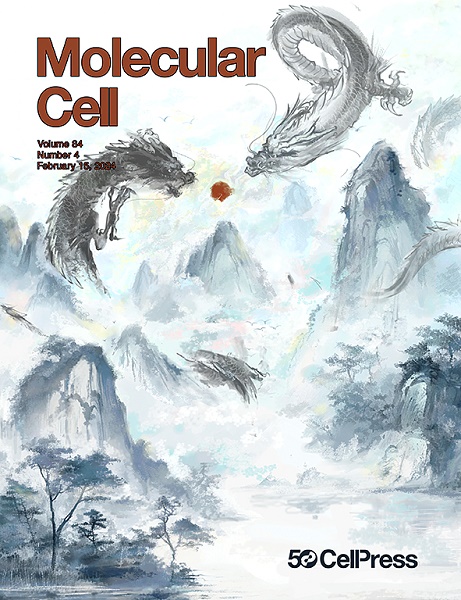mRNA export factors store nascent transcripts within nuclear speckles as an adaptive response to transient global inhibition of transcription
IF 14.5
1区 生物学
Q1 BIOCHEMISTRY & MOLECULAR BIOLOGY
引用次数: 0
Abstract
Several transcription inhibitors have been developed as cancer therapies. However, they show modest clinical activity, highlighting that our understanding of the cellular response to transcriptional inhibition remains incomplete. Here we report that potent inhibitors of transcription not only impact mRNA output but also markedly impair mRNA transcript localization and nuclear export. We demonstrate that retention of newly transcribed mRNA in nuclear speckles is an adaptive response to chemically distinct transcriptional inhibitors. Retained transcripts are fully processed and accumulate in proportion to the expression level of the genes from which they emanate. The TREX mRNA export complex plays an integral role in directing nascent transcripts to nuclear speckles where they are bound to NXF1, protected from degradation, and poised for rapid export following re-initiation of transcription. Our findings provide new insights into the crosstalk between transcription and mRNA export with important implications for drugs aiming to inhibit transcription for therapeutic gain.

mRNA输出因子将新生转录物存储在核斑点中,作为对瞬时全局转录抑制的适应性反应
一些转录抑制剂已被开发用于癌症治疗。然而,它们表现出适度的临床活性,突出表明我们对转录抑制的细胞反应的理解仍然不完整。在这里,我们报道了有效的转录抑制剂不仅影响mRNA的输出,而且显著损害mRNA转录本的定位和核输出。我们证明在核斑点中保留新转录的mRNA是对化学上不同的转录抑制剂的适应性反应。保留的转录本经过充分的处理,并根据它们产生的基因的表达水平成比例地积累。TREX mRNA输出复合体在引导新生转录物到核斑点中起着不可或缺的作用,在核斑点中,它们与NXF1结合,免受降解,并准备在转录重新启动后快速输出。我们的研究结果为转录和mRNA输出之间的串扰提供了新的见解,对旨在抑制转录以获得治疗效果的药物具有重要意义。
本文章由计算机程序翻译,如有差异,请以英文原文为准。
求助全文
约1分钟内获得全文
求助全文
来源期刊

Molecular Cell
生物-生化与分子生物学
CiteScore
26.00
自引率
3.80%
发文量
389
审稿时长
1 months
期刊介绍:
Molecular Cell is a companion to Cell, the leading journal of biology and the highest-impact journal in the world. Launched in December 1997 and published monthly. Molecular Cell is dedicated to publishing cutting-edge research in molecular biology, focusing on fundamental cellular processes. The journal encompasses a wide range of topics, including DNA replication, recombination, and repair; Chromatin biology and genome organization; Transcription; RNA processing and decay; Non-coding RNA function; Translation; Protein folding, modification, and quality control; Signal transduction pathways; Cell cycle and checkpoints; Cell death; Autophagy; Metabolism.
 求助内容:
求助内容: 应助结果提醒方式:
应助结果提醒方式:


